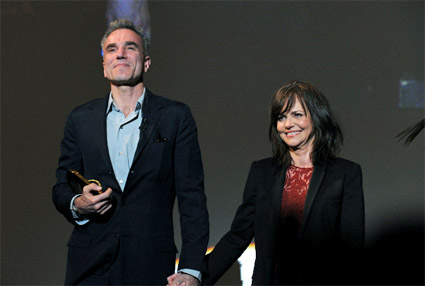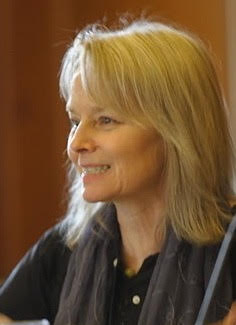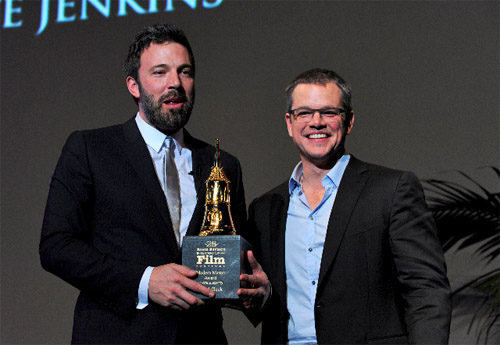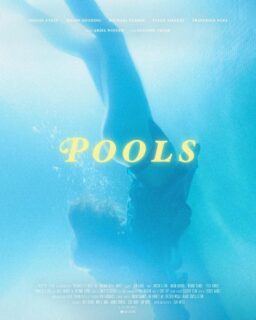Seasonal anticipation: as 2013 debuted, many were feeling it. The 28th iteration of the Santa Barbara International Film Festival, aka “SBIFF,” was on the wind, with jazzed moviegoers soon to converge elbow-to-elbow in a familiar, even familial, and happy bustle on downtown’s State Street.
I was among the excited, as this would be my third year covering the festival. And for me, extra sweetening would be provided by the tribute to Daniel Day-Lewis, the oft-reticent acting genius whose reanimation of Abraham Lincoln seemed certain to bring another Best Actor Academy Award — his 3rd, making him the only actor to surpass Marlon Brando, who received 2.
Then real life intervened — and for the best of reasons: “Losing the West,” a feature-length documentary by Alex Warren on which I’m a co-producer, was invited to another festival and on that very weekend. So Alex and I flew off to Dallas. Connecting with our social media pro, Athena Nash, who’d flown in from Boulder, we rented the glittering red Ford pick-up that took us north to Duncan, Oklahoma.

The Trail Dance Film Festival is a young one, founded just 7 years ago by a passionate movie guy named Anthony Foreman, its executive director. Folks of several generations journey to this small town along the historic Chisholm Trail. Some are there to screen a film they’d made, others to watch as many as they could. At the opening reception at Duncan’s very attractive Heritage Center, we meet Colorado filmmakers David Higgins and Bobby Deline, whose “The Aviation Cocktail” will win the festival’s Best Narrative Feature on Sunday. With them we discover the sole after-hours spot, the VFW, complete with karaoke and lots of cigarette smoke, and sleuth out the best Mexican restaurant.
“Uprising” is an account of the 2-year-old Egyptian revolution made by producers of “Taxi to the Dark Side,” as told through the perspectives of its participants and leaders. Watching with a crowd, I enjoy the thought of Americans in the middle of the country able to take in this doc about Egypt. That’s one excellent reason for film festivals, which have now sprung up in the soil of cities and towns all over the U.S. and around the world: it’s a chance to see places one may never visit, and learn of stories and people one may never hear nor meet.
Also shown is the enjoyable feature “Queens of Country” (co-directors Ryan Page and Christopher Pomerenke) — a fictional tale of a young girl wanting to emulate the classic female country stars. An added attraction: the post-screening appearance of ’50s-’60s rockabilly star Wanda Jackson, an Oklahoma native whose best-known hit is “Let’s Have a Party.” Now 75, her career was revived last year with a record produced by the ubiquitous, multi-talented Jack White. Wanda Jackson performing in the ’50s:
Our screening of “Losing the West” is well-attended; the Q & A afterwards deftly handled by director Alex Warren who, at over six feet and half-Greek, is unmissable anywhere she goes. The questions are excellent, conveying that the audience has really understood what we wanted to explore. It’s a good day — and very special as our first in a festival. (And for me, so interesting in the way it reverses my usual perspective: not as one filmgoing writer, but flipped around — an actual participant.)
That Sunday night, arrival back at LAX is later than projected, but at 1 A.M., I press on to Santa Barbara, the rest of its great feast of films in my mind’s eye.

In SBIFF’s Press Office Monday morning, as her charming new associate Hannah Johnson hands me the festival brochure, PR impresaria Carol Marshall is still savoring Saturday night’s presentation of the Montecito Award. “Daniel Day-Lewis was amazing,” she reports with a sparkling smile. “So open and giving. Just a wonderful man.” He’s even stayed two hours at the after-party, something rare for him.

Daniel Day-Lewis with Sally Field, his “Lincoln” co-star at SBIFF.
Oh, gosh, I’ve missed him.
Oh, well — and on to the films.
“Kon-Tiki” is my first foray, a Norwegian film of the actual 1947 voyage by archaeologist and explorer Thor Heyerdahl. He’s bent on proving that Peruvians, relying on the winds, had crossed the Pacific and resettled in Polynesia, a theory no one had ever believed, and decries when he posits it. Deciding proof will only come by recreating that journey down to its details, Heyerdahl and a hand-picked crew construct a primitive raft of balsa wood and materials consistent with much earlier times.
Heyerdahl’s eventual account of the expedition has been translated into 67 languages and sold in the millions, inspiring many others to try it. A documentary made from actual expedition footage, “The Kon-Tiki Experience: By Raft Across the South Seas,” won an Academy Award in 1951.
This narrative recreation of that 100-day journey, directed by Joachim Ronning and Espen Sandberg (“Max Manus”), starts slowly, and feels a little forced. I’m relieved when a character says of Heyerdahl, “He’s pompous and self-absorbed…” (exactly what I’m thinking) “…but a great leader.” Given a little more time, one becomes utterly absorbed in the adventure, pulled along by these six men — hunky Scandinavians, it must be said — stuck on their small, frail raft, truly a speck on the ocean. Only one of the six swims, and it is not Heyerdahl, who nearly drowned as a child.
As seasickness and one man’s touch of madness visits them, and as the sharks become unwanted, constant companions, a powerful, thrilling and technically challenging tale is conjured. The culminating scene had our SBIFF audience at the (figurative) edge of its seats. “Kon-Tiki” is one nominee in a strong Oscar field for this year’s Best Foreign Film. I’d be surprised if it wins, but recommend it to all, especially on the big screen.
Next selection: “Jackie,” a film from the Netherlands by director Antoinette Beumer. Shot mainly in the American southwest, this is a story of Dutch twin sisters (played by actual twins, actresses Carice and Jelka van Houten), the adopted daughters of a gay couple. Now grown up, they’ve never met their American birth mother and only one has ever cared to. But when a startling phone call from an American rehabilitation clinic reports their mother has had a serious accident and needs them, “her only living relatives,” they embark with feelings of dubious curiosity on what becomes a cross-cultural road movie in that great American tradition.
In some ways a salute to “Thelma and Louise,” this female story is not a chick flick (that demeaning term) but a deeply involving exploration of sisters and mothers. There’s a twist ending which took a moment to accept, but the story’s turns are sweet, then bitter, and often funny, capped by top drawer performances and Danny Elsen’s languidly gorgeous cinematography. And one more thing: the mom and title character is played by the inimicable Holly Hunter, much too rarely seen these days — and the piece de resistance of “Jackie.”
The name Margarethe von Trotta draws me to the next film, “Hannah Arendt.” From 1975’s “The Lost Honor of Katharina Blum,” I’ve admired this director, part of the New German Cinema movement which includes Werner Herzog, Wim Wenders and Rainer Werner Fassbinder, and who is sometimes called “the world’s leading feminist filmmaker.” Her latest stars the very fine Barbara Sukowa, whose lead in von Trotta’s “Mariane and Juliane” (1981) garnered a best actress award at the Venice Film Festival. Here Sukowa portrays the noted German-American Jewish intellectual author at a critical point in her life.
As the film opens, Arendt is in later middle age, teaching at New York’s New School, happily married and socializing with the era’s intelligentsia, novelist Mary McCarthy (The Group) among them. In 1961, the Israeli capture of the Nazi officer/war criminal Adolph Eichmann, a top target of Simon Wiesenthal and others since the WWII’s end, provides a perfect topic for Arendt, whose lifelong concern has been the nature of power and totalitarianism. Once The New Yorker agrees to publish it, Arendt departs for Jerusalem to cover the trial. Sitting in the court room day after day, with Eichmann testifying from a glass cage, she is startled to quickly perceive him as an unimpressive nothing of a man just following orders, an example of “the banality of evil.” Her now-familiar phrase — and her assertion that at least some Jewish leaders had initially placated the Nazis — caused an international uproar and her excommunication from several circles.
Introduced at SBIFF as “Germany’s ‘Lincoln,'” it’s an apt designation for this very serious film; as with “Lincoln,” moviegoers should prepare to delve in deeply, and perhaps expect to do a little extra historical research, in order to understand the times and these crucial issues. In saying that, I’m not disparaging this film, which creates a valuable record along with engaging performances by Sukowa, Janet McTeer as McCarthy, and Nicholas Woodeson as “The New Yorker” editor William Shawn. In particular, the world of mid-20th century Manhattan is wonderfully recreated, with cinematographer Caroline Champetier and production designer Volker Schafer doing stellar work. (And how thrilling to note in the credits that most of the key crew are women!) For those like me who delight in well-made historical films, von Trotta’s “Hannah Arendt” is one to see.
“About 111 Girls” (“Darbare 111 Dokhtar”) was produced by the Kurdish directors Nahid Ghobadi and Bijan Zamanpira, and written by Bahman Ghobadi, husband of Nahid. The story channels Aristophane’s classic play, Lysistrata, in which one crusading woman persuades the women of Greece to withhold sex in order to end the Peloponnesian War. Here, a letter is sent to the President of Iran, demanding that he provide them with husbands or 111 women will commit mass suicide. Given a 48-hour deadline, an emissary of the President is sent by four-wheel drive to avert tragedy. With him are an aide and the Kurdish boy who has delivered the message. What seems a straightforward story quickly enters the realm of surrealist comedy, as these befuddled city men can’t even locate the Kurdish state, taking various wrong turns which result in encounters with strange young men gathering aimlessly along the road, old village men shooting at them, and military men waiting 18 hours in the desert for permission to behead a wriggling, moaning man tied into a bag, who somehow escapes and keeps reappearing in the film, still encased in the bag.
Eventually we learn these “girls” don’t really want husbands who, due to so much war, are indisputably lacking in numbers, not to mention in appropriateness. What they really seek is respect for the land of Kurdistan, so long mistreated from all directions by (as the film is slyly pointing out) mainly men. “About 111 Girls” is a deeply mysterious film about a world still unknown and misunderstood by most westerners. With its flat-out astonishing cinematography by Hamid Ghavami, this was one of my SBIFF favorites, even as I knew I was missing a lot of its subtext, and surely will most happily see it again.

Coming out of a darkened theatre, bleary-eyed and held in a film’s grasp — that’s the norm at a film festival. This year at SBIFF, the crowds seem even thicker than usual (evidence, perhaps, of an improving economy?), and a brilliant Santa Barbara sun is blinding as I peer at the sidewalk scheduling board. What shall I see now? Others in the crowd suggest that “everyone” is talking about “The Body,” which has emerged a festival favorite, and is repeating momentarily in the Metro 4 right behind us.
So okay, I’ll check it out…
“The Body” (“El Cuerpo”) comes from Spain. Director Oriol Paulo, who is also credited as co-writer with Lara Sendhim, explains that his thriller was conceived “somewhere between psychological horror and film noir — with Hitchcock always in mind.” Situated in a morgue where a body has gone missing, a rather harried, middle-aged detective must make sense of the case. Said body belongs to a wealthy corporation owner and femme fatale, who has only recently married a younger man. He’s initially the key witness, but his possible guilt in her disappearance becomes central to the story; an unexpected development further along brings a surprise ending.
Nicely shot by Oscar Faura, this is a handsome film, and well-acted film by Belen Rueda, Hugo Silva, Aura Garrido and Juan Pablo Shunk. As I ponder it as an apparent festival hit, I decide it’s the pacing, just right for a thriller, which makes that so. A couple of moments have the woman next to me jumping in her seat. Though (as people sometimes joke in film school) “it won’t revolutionize cinema,” “The Body” is an enjoyable two hours and definitely worth catching. With Sony releasing, it should be in U.S. theaters within the next few months.
Over the years I’ve seen many of the documentaries always programmed at SBIFF; this year, just two. After Stan Getz, tenor saxophonist/flutist Charles Lloyd’s “Forest Flower” lp was my first immersion in instrumental jazz, making “Charles Lloyd” a must-see. Directors Dorothy Darr and Jeffery Morse attempt to capture the life and career of this vibrant jazz artist, a Santa Barbara resident who continues touring internationally at 74. Unfortunately, as a film it’s a bit disappointing. Trying to tell the story via interviews doesn’t quite work here; narration (possibly rejected by the filmmaker as too conventional) would have helped give this film more shape. But lots of interesting photos and performance footage will satisfy fans.
The second doc is “Greenwich Village: Music That Defined a Generation,” directed by Laura Archibald. It’s another music film, packed with interviews with the era’s singer-songwriters, authors and performers, as well as some performance footage. Archibald makes a nice choice in using excerpts (voiced by Susan Sarandon) from the memoir A Freewheelin’ Time: Greenwich Village in the Sixties by Suze Rotolo, an artist/illustrator who remains best-known as Bob Dylan’s girlfriend (remember her with Dylan on his Freewheelin’ LP?), but for me there isn’t enough of it.

Instead, while watching all of these talented performers (Buffy Sainte-Marie, Richie Havens, Carly and Lucy Simon, Judy Collins, Eric Anderson, Tom Paxton and at least 20 more), I’m struck by how some of them deserve full documentaries of their own, and some — I’m thinking Pete Seeger — require more than that. Seeger, now in his 90s, nearly blind but joyful as ever, makes this comment: “If there’s a world here in 100 years, one of the main reasons will be music.” A sampling of that essential music is pulled together in “Greenwich Village” but, in taking on such a big subject, the filmmaker simply bit off more than she could chew. Nevertheless, aficionados of the time and its great sounds will enjoy seeing it.
The programming at SBIFF, I’ve learned, can be trusted. Festival Director Roger Durling, Programming Director Michael Albright, and staff work hard to identify and bring in dozens of excellent films from around the planet. So it’s uncommon for me to really dislike many films, and this year there’s just one.
“Sex After Kids” by Canada’s Jeremy LaLonde was a big crowd-pleaser. I found it a reasonably well-produced, decently acted failure, with a cringe-making script. Perhaps it would work better on television (possibly even as a series?), but in its present form it’s all scattershot, overly cute moments and predictable scenarios, telling stories of characters seemingly selected for demographic range. There’s the single mom with a weird brother, the lesbian couple, the empty-nest couple, the mixed-race couple, the single dad who joins the moms’ group. The director writes that after having kids, he saw his marriage change, wondered if this was true for others, researched the subject and wrote a script. That’s exactly what it seems to be: a formula, without magic or real emotion. Sitting in the center of a full house, I can’t possibly escape, but gosh, I want to.
Fortunately, the very next film is an antidote — a drama for grown-ups, and thank heaven for that! Chosen to compete for the Golden Bear at 2012’s Venice Film Festival, “Betrayal” (“Izema”) by Russian director by Kirill Serebrennikov has two principal characters: a physician (German actress Franziska Petri) who, while examining a patient (Macedonian star Dejan Lilic), tells him straightforwardly that her husband is having an affair. Surprised, he expresses sympathy, but then she adds that the affair is with his wife. Now, of course, he’s interested. But how does she know? She’s followed them, she tells him, and has discovered they go to the same hotel, always staying in the same room. After he confirms this (by following them, too), the doctor and patient are drawn together in a story of more than one betrayal, built on startling, even shocking, plot points.
As it ends, late on the last night of SBIFF, the audience stays quiet in its seats. Ahead of me, one woman whispers, “Wasn’t it very Russian?” Her companion agrees, murmuring something about Tarkovsky. I don’t really know what she means, but think back to another Russian film, “The Banishment” (“Izgnanie,” 2007), which I’d seen and loved last year. Whatever it is to be “very Russian,” I know with no uncertainty that I’d just been immersed in an exceptional, literate and sexy modern film noir, compelling for all of its 115 minutes. See it. See it.












